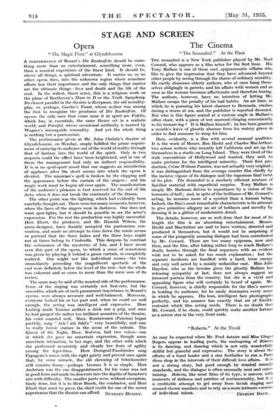The Cinema
" The Scoundrel." At the Plaza-
THE scoundrel is a New York publisher played by Mr. Noel Coward, who appears as a film actor for the first time. His Tony Mallare is one of those cool, epigrammatic villains who like to give the impression that they have advanced beyond other people by seeing through the shams of ordinary morality. He curtly dismisses elderly authors, who at once hang them- selves obligingly in garrets, and his affairs with women end as soon as the woman becomes affectionate and therefore boring. The authors, however, have no intention of letting Mr. Mallare escape the penalty of his bad habits. An air liner, in which he is pursuing his latest charmer to Bermuda, crashes during a storm at sea, and the publisher is reported drowned. But who is this figure seated at a curiolis angle in Mallare's office chair, with a piece of wet seaweed clinging conveniently to his trouser-leg ? It is Mallare himself; he has been granted a month's leave of ghostly absence from his watery grave in order to find someone to weep for him.
Here, evidently, is a film with several unusual qualities- It is the work of Messrs. Ben Hecht and Charles MacArthur, two screen writers who recently left California and set up for themselves in a studio on Long'Island. They were tired of the stale conventions of Hollywood and wanted, they said, to make pictures for the intelligent minority. Their first pro- duction, Crime Without Passion, was not actually very original ; it was distinguished from the average murder film chiefly by the incisive vigour of its dialogue and the ingenious final twist of its plot. The Scoundrel is a similarly efficient mixture of familiar material with superficial surprise. Tony Mallare is simply Mr. Badman driven to repentance by a vision of the torments of hell ; and, in spite of the brilliance of Mr. Coward's acting, he remains more of a symbol than a human being. Indeed, the film's most remarkable characteristic is its attempt to give primitive allegory an air of boldness and novelty by dressing it in a glitter of modernistic detail.
The details, however, are so well done that for most of its length the film is an absorbing entertainment. Messrs. Hecht and MacArthur are said to have written, directed and produced it themselves, but it would not be surprising if some of the pungently amusing dialogue had been contributed by Mr. Coward. There are too many epigrams, now and then, and the film, after taking rather long to reach Mallare's death, hurries through the final sequences with an evident wish not to be asked for too much explanation ; but the separate incidents are handled with a hard, terse energy and very well acted by a mainly unfamiliar cast. Miss Julie Haydon, who as the heroine gives the ghostly Mallare her releasing sympathy at last, does not always suggest an innocent poetess from the country, but she is a vivid and appealing figure who will certainly be heard of again. Mr. Coward, however, is chiefly responsible for the film's success in holding its audience, for he easily dominates every scene in which he appears. His lean, intelligent face photographs perfectly, and his manner has exactly that air of forcible restraint which film acting needs. There is no doubt that Mr. Coward, if he chose, could quickly make another fortune as a screen star in the very front rank.


























































 Previous page
Previous page